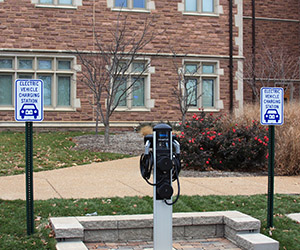That’s not a new parking meter or air pump for your tires outside of Stephen F. & Camilla T. Brauer Hall — it’s a charging station for electric vehicles.

Chancellor Mark S. Wrighton; Ralph Quatrano, PhD, dean of the School of Engineering & Applied Science, and Pratim Biswas, PhD, the Lucy and Stanley Lopata Professor and chair of the Department of Energy, Environmental & Chemical Engineering, will formally introduce the charging station at 3:30 p.m. Thursday, Nov. 29, in the parking lot outside of Brauer Hall, where two parking spots have been reserved for electric-powered cars.
Installation of the station, purchased by Washington University, stems from an independent study project by Elizabeth Mohr, a sophomore majoring in chemical engineering. Working with Biswas, Mohr did a lot of research and legwork before presenting the results.
“I learned a lot about electric vehicle charging stations and all of the features and different considerations that you have to look at when choosing one,” Mohr says.
The charging station can charge two vehicles simultaneously. Similar to the WeCar rental system, drivers of electric-powered cars will be able to register online with or visit Parking and Transportation Services and get a key fob with an RFID chip that they can hold up to a reader on the charger. Once recognized, the charging handle will unlock. Users may also call the toll-free phone number on the charging station to activate it. A full charge takes about four hours. There will be no cost to users.
“We hope that this will motivate our employees and students to drive electric vehicles to campus,” Biswas says. “In a few months, one of the WeCars available for rent will be electric-powered.”
The car-charging station is another step in the university’s commitment to sustainability and to use resources wisely in its operations. In addition, Brauer Hall is certified LEED Gold, a high rating by the U.S. Green Building Council for green building design and construction.
Phil Valko, director of sustainability, says the electric vehicles have the potential to reduce both carbon emissions and the reliance on fossil fuels for the transportation sector.
“Electricity is a currency,” he says. “You can create it using myriad different sources — coal, natural gas, sunlight, biomass, wind and other things,” he says. “Switching over to a currency-based form of transportation is important because it allows for flexibility and opens the door for renewables to power our vehicles.”
Another station is already planned for the Millbrook Parking Facility as part of the Bauer Hall building under construction. Depending on demand, the university may install additional charging stations in other parking locations, says Steve Hoffner, associate vice chancellor for operations.
While there are about 10 public stations within a 20-mile radius around the St. Louis metropolitan area, this is the second at a higher education institution; St. Louis Community College in Wildwood has four charging stations.
Mohr will collect data from the charging stations to compare with data from a gasoline-powered and a hybrid car. Preliminary analyses suggest that for the St. Louis region, common electric cars produce fewer carbon emissions than gasoline-powered cars that have a mileage of about 39 miles per gallon or less.
“We are doing this to connect to our research,” Biswas says. “We will get electricity from Ameren on the grid, but if we get sufficient resources, we might install a shed with solar panels and an energy storage unit, or battery system, to charge the station. The station also will be connected to the Internet, so people can see how much electricity is being used and how much it costs.”
Electric cars have several environmental benefits – they have reduced greenhouse gas emissions and pollutants and reduce the dependence on imported foreign oil. Some even allow drivers to use their smartphones to track the battery’s charge and to save on energy costs by scheduling off-peak charging. Vehicles that run solely on electricity can run for up to 100 miles on a single charge, Biswas says, but only if the car is driven sensibly.
One of the drawbacks to an electric vehicle is the short battery life, Biswas says. But Venkat Subramanian, PhD, associate professor of energy, environmental & chemical engineering, is studying this with a $3.2 million grant to design a battery management system for lithium-ion batteries that will guarantee their longevity, safety and performance.
In conjunction with the Solar Energy Research Institute for India and U.S. (SERIIUS), a new $25 million initiative, the university with its partners, such as MEMC Electronic Materials Inc., expects to advance the use of solar energy systems. The university has also launched the Solar Energy and Energy Storage (SEES) initiative that will bring researchers together to work on renewable energy systems, coupled with storage, that will promote its use, deployment and development.